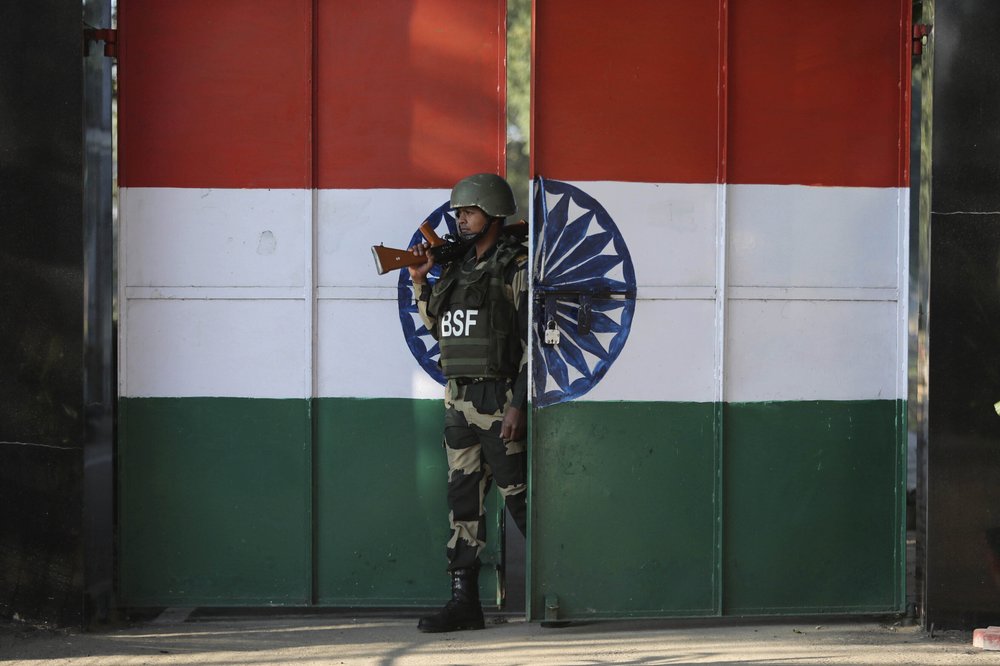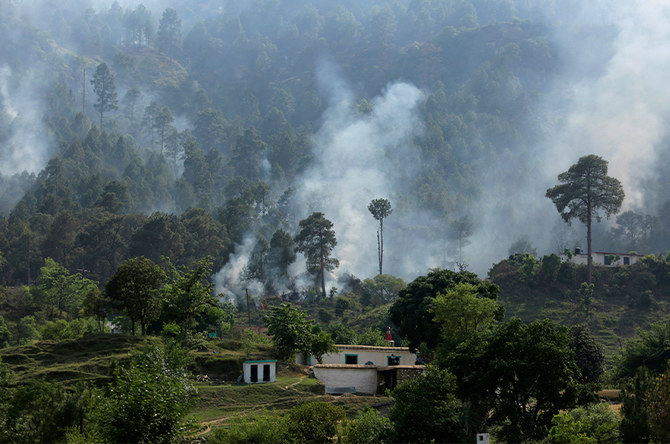SRINAGAR: The machine guns peeking over parapets of small, sandbagged concrete bunkers and the heavy artillery cannons dug deep into Himalayan Kashmir’s rugged terrain have fallen silent.
At least for now.
The Line of Control, a highly militarized de facto border that divides the disputed region between the two nuclear-armed rivals India and Pakistan, and a site of hundreds of deaths, is unusually quiet after the two South Asian neighbors last month agreed to reaffirm their 2003 cease-fire accord.
The somewhat surprising decision prompted a thaw in the otherwise turbulent relations between the countries but also raised questions about the longevity of the fragile peace, in part due to earlier failures. The crackdown by Indian forces and attacks by rebels have continued inside Indian-held Kashmir.
The cease-fire, experts say, could stabilize the lingering conflict that has claimed tens of thousands of lives. Kashmiris say the rare move should lead to resolution of the dispute.

In this February 26, 2019, file photo, Pakistani Kashmiri residents climb out of a bunker built outside their home in border town of Chakoti situated at the Line of Control in Pakistani Kashmir. (AP)
It was unclear what prompted the two militaries to adhere to the accord they had largely ignored for years. But experts point to a climbdown by both from their earlier stance following a decision by India to strip Kashmir of its semi-autonomy and take direct control over the region in 2019, and its monthslong bitter border standoff with China.
Paul Staniland, associate professor of political science at the University of Chicago, said the ongoing costs of clashes along the Line of Control, the economic effects of the pandemic, and other foreign policy challenges facing both countries might have combined to create incentives to pursue a cease-fire.
Since 2003, the cease-fire has largely held despite regular skirmishes. Both India and Pakistan claim the region in its entirety and have fought two wars over it, and in the Indian-controlled portion of Kashmir, militants have fought against Indian rule since 1989.

In this December 18, 2020, file photo, Indian army soldiers patrol along the Line of Control (LOC) between India and Pakistan border in Poonch, about 250 kilometers (156 miles) from Jammu, India. (AP)
Each country has accused the other of heightening tensions by significantly ratcheting up border attacks in the last four years, leading to the deaths of soldiers and villagers.
The ceasefire announcement came shortly after China and India agreed to a military disengagement from a portion of their disputed border after a monthslong deadly military standoff. It had led to fears of a two-front war between India and China, with the latter assisted by its closest ally, Pakistan.
“Some sort of pressure, possibly from Washington and Beijing for different reasons, is pushing India and Pakistan for wider peace moves in the region,” said Siddiq Wahid, historian and former vice chancellor of the Islamic University of Science and Technology.
Beijing wants Pakistan to focus on securing its investments as part of the Belt and Road Initiative, a massive, cross-continental infrastructure development project aimed at expanding China’s commercial connections globally. Islamabad is a key partner and some Chinese-built highways snake through Pakistani-controlled Kashmir. The U.S., on the other hand, is courting India to focus its energies on countering China.
“If Pakistan is indeed looking to move toward a new regional role, embracing geopolitics, reducing tensions with India is a must, and if India is going to pivot to deal with a rising China, it has reasons to want to calm relations with Pakistan,” said Staniland, a South Asia expert. “The real question is whether these reasons remain powerful enough over time.”
The thaw in relations became apparent when Indian Prime Minister Narendra Modi, an avowed Hindu nationalist, ceased playing up rhetoric against Pakistan and referencing Kashmir in campaigning for elections in four key states.
In Pakistan, too, political leadership and the powerful military have shifted from their earlier position of not engaging with India until it reversed its decision to annul Kashmir’s semi-autonomy.
Last week, Pakistan’s army chief Gen. Qamar Javed Bajwa said it was time for the two countries to “bury the past” and resolve the dispute over Kashmir peacefully. His remarks followed Pakistan Prime Minister Imran Khan’s repeated calls for good relations with India with a caveat that the Kashmir dispute remains at the center of any future talks. Since the announcement of the cease-fire, Khan, too, has abandoned his past rhetoric against Modi.
Modi appeared to reciprocate, sending last week a letter to Khan seeking cordial relations. Khan replied Tuesday but reiterated that lasting peace was mainly contingent on resolving the future of Kashmir.
The rapprochement has sparked skepticism among Kashmiris who fear the dispute could be pushed to the backburner given the fast administrative and political changes in the region by India that they have likened to settler colonialism.
“We are not against talks and want an end to violence. But there has to be an end to repression too,” said Mirwaiz Umar Farooq, an influential Kashmiri separatist leader who has been under house arrest since August 2019. “The whole idea behind the negotiations has to be a resolution of the Kashmir issue as per the wishes of its people.”
In the past, Pakistan and India made multiple attempts to broker a deal over Kashmir. They also initiated confidence-building measures like exclusive barter trade between two parts of Kashmir, sporting games and bus services for divided families.

In this January. 23, 2020, file photo, an Indian Border Security Force soldier walks through a gate painted with the Indian flag at the India-Pakistan border at Suchet Garh in Ranbir Singh Pura, about 27 kilometers (17 miles) south of Jammu, India. (AP)
“The cease-fire can lead to relative peace but one should not expect lasting peace,” said Vinod Bhatia, who was India’s director-general for military operations from 2012 to 2014.
Meanwhile, villagers living along the frontier are paying the price.
The lives of Nader Hussain and Munshi Muhammad Arshad are divided by a barbed concertina wire. Hussain lives in Indian-controlled Kashmir and Arshad in the part controlled by Pakistan.
In late November, Hussain saw an artillery shell fired by Pakistani soldiers fly towards him in his mountainous village. The 50-year-old couldn’t outrun the projectile and lost both legs in the blast. Two other men were killed on the spot.
“The two countries do politics on our bodies, but this must end,” he said.
On the other side, the 45-year-old Arshad, who lost his father to an artillery shell fired by Indian soldiers, hoped for peace.
“But a durable peace,” he said, “will only come when the Kashmir issue is resolved.”
















